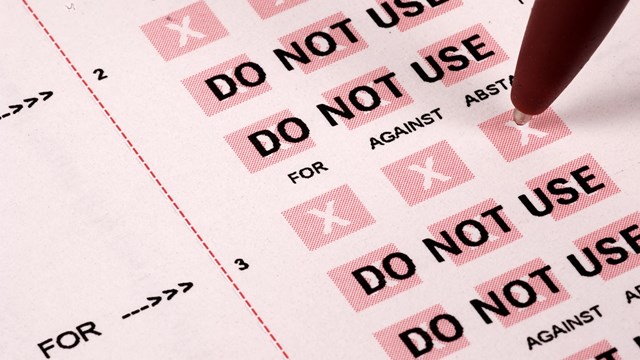It is an annual rite of passage for owners of co-ops and condos. Once a year or thereabouts, they gather in a common area—in my old building it was the basement, right off the washers and dryers—and vote for next year’s board. Sometimes the elections are closely contested. Sometime the same people stay on the board for decades. Sometimes—as was the case with my building—we owners were so desperate not to be on the board that we elected a president who didn’t even live in the building.
However you slice it, electing or reelecting a board is one of the most important duties the residents of a co-op or HOA have on behalf of their community. After all, board members are the ones who make the crucial decisions about how their community is run, from scheduling maintenance to overseeing major capital improvements.
These elections are not necessarily as simple as they seem, especially in bigger, more populated buildings. Let’s take a look at the many ins and outs.
Q: How often do elections have to occur?
“Every condo and co-op has bylaws,” says Linda Gibbs, executive director of the Honest Ballot Association based in Floral Park, New York. The organization was started by Theodore Roosevelt in 1909 to run fair and honest elections. “They have to go according to the bylaws—usually annual meetings, elections once a year.”
When these elections occur is not at the whim of a board—although it may seem that way sometimes.
Q: What laws govern elections?
“There is a law covering it: the Non-Profit Corporations Act,” says Bruce Freeman, a partner with the law firm of Woehling & Freeman in Westfield. “It’s also incorporated in every set of governing documents.”
The board is not just a group that runs the association—it is also a group that runs the business.
“You have to have an election, pursuant to bylaws,” says David J. Byrne, Esq., a shareholder at thelaw firm of Stark and Stark in Lawrenceville. “If you’re run by a board, you have to have an election—it’s just a question of when.”
Q: How can elections vary?
One way elections can vary is by staggering the terms of certain officers. For example, in year one, the president and secretary are up for election, and in Year Two, the vice president and treasurer. This is something you encounter more and more often in HOAs across the country.
“Staggered terms are very common,” says Byrne. “And they are the best way to operate.”
This is because boards of directors are not hockey teams, where there are teams within the team that work different shifts. If two people remain on the board, those officers keep alive the institutional memory, and things run more smoothly.
Q: Does the election process differ
between co-ops and condos?
The difference between the election process in co-ops and condos is more technical than operational.
“It’s just the shares. They’re either a share voting or percentage voting,” says Gibbs.
Q: Who oversees the process?
In addition to being elected, the board must also oversee the election process. This cuts to the core of the mini-democracy that makes homeowners associations so special.
“The board’s responsibility is to schedule, set up, and send out documents that are required to conduct the meeting,” says Freeman. “The president of the board is typically the presiding officer for the annual meeting.”
The board should look at the elections like they are instruments of democracy.
“Setting it up so you get as close as you can to the ideal of free exercise of choice,” says Freeman. “That’s their responsibility.”
Q: What are proxies?
Unlike in municipal elections, condos and coops generally let shareholders vote via proxy. A proxy is just what the name implies: a stand-in for an owner who can’t or doesn’t feel like attending the meeting.
“It’s a manner by which owners can vote without being physically present at the meeting,” Freeman explains.
There are two kinds of proxies: directed proxies and general proxies.
Q: How do proxies work?
“The governing documents generally obligate associations to allow for proxies,” says Byrne. “A condo will provide directed proxies, which are more like absentee ballots. ‘Sign here and let the president vote on your behalf, but he can only vote for who you say.’”
General proxies carry a bit more weight.
“That’s when I sign a proxy saying, ‘he can do whatever he wants at the meeting,’” Byrne explains.
Proxies do not have to be notarized, or signed in front of a witness. This can open the door for conflicts.
Q: What problems arise with proxy voting?
“It’s always a problem with proxies,” says Gibbs. “Candidates knock on doors, they try to get proxy votes. It’s a matter of who got there first.”
Sometimes, Candidate A will go to the door and get Resident X to sign a proxy. Later, Candidate B will show up, and Resident X will change her mind. Then, Resident X may show up at the meeting anyway, only to vote for Candidate C. This can give migraines to whoever is in change of collecting ballots.
“A hot-button issue in elections is abuse of proxies,” Freeman says.
The way around this potential pitfall is for shareholders to sign in before elections, Freeman says, and cross-reference the names with the proxy votes already collected.
Q: How are elections actually
conducted?
The actual process of voting varies from building to building, from HOA to HOA, and depends on whether the elections are contested or not. In uncontested elections—that is, elections in the old Soviet style, where there is one candidate per office—the voting can be done by voice, or by show of hands.
“A lot of times, elections are done in the most practical way,” says Byrne—“the simplest and cheapest way to do it.”
This may not be the by-the-book way.
“Often, they’re not done technically right,” says Byrne. “You can go 30 years without a problem.” But, problems can flare up during contested elections, when, say, two residents are running for board president.
In contested elections, the process is more complex. The candidates give quick speeches—harkening back to elections for class president in elementary school—and the voting is done on paper.
The voting is usually orchestrated by the managing agent and/or the accountant (hopefully the old joke—there are three kinds of accountants; those who can count, and those who can’t—has no truck in real life), with the attorney supervising.
Q: Who are inspectors of elections?
In some cases, special inspectors of elections are appointed. Despite the lofty title, inspectors of elections are people from the audience chosen to do the duty.
“They don’t have to be lawyers or professionals,” says Byrne. “They can’t be the candidates, obviously, and they can’t be affiliated with the candidates”—spouses, children, parents, roommates, and so forth.
In legal terms, inspectors of elections are important.
Q: What if the election is close? Can you
demand a recount?
“If there’s a challenge to an election, the state, through the Non-Profit Corporations Act, says that the challenge first goes to the inspectors of elections, and then to superior court,” says Freeman.
It is not the legal weight that makes inspectors of elections a prudent choice in any election.
“When I’m running elections, I like to have inspectors,” says Byrne. “It gets people involved in the process.”
Q: What’s the safest way to run an
election?
The most above-board way to hold an election is to outsource the process to an independent election tabulation firm.
“We like to do an election from beginning to end,” says Gibbs, of the Honest Ballot Association. “We’re objective—we don’t care one way or the other who wins.”
The hardest part of elections can be getting enough people in the room to make the results official. Boards sometimes offer door prizes and raffles, in addition to coffee and cake, just to get people to show up.
“We try to help make sure they get a quorum,” says Gibbs.
Ballots are generally counted in another room. Gibbs physically removes the ballots from the premises, and provides the results the next day.
Q: How long does the election process
take?
The board must notify residents of an election no sooner than 10 days prior to the voting. The entire process, from giving decent notice, to conducting the election, takes about three weeks, Gibbs says.
Greg Olear is a freelance writer and a frequent contributor toThe New Jersey Cooperator.







2 Comments
Leave a Comment